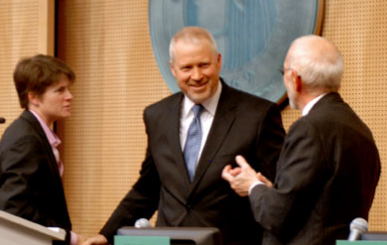
Just over a year out from a November 2014 election, Seattle Mayor Mike McGinn is in the middle of a major political makeover. A few months ago, it was a foregone conclusion that the rookie mayor was a one-term placeholder until a real candidate came along.
Taking office in the teeth of the recession, McGinn has not had good news to report to citizens so much as less-bad news. But all that is changing, just as trouble-making tunnel tolls prompt legislative head-scratching.
McGinn came to office in part because of the divisive deep-bore tunnel plan, but after playing out his opposition for as long as possible, he lost that fight. Derided early on in editorial pages as Mayor McSchwinn, he’s become a lightning rod for the “war on cars” crowd. He’s had terrible weeks, and gotten bogged down in controversies of his own making, as well as those of Seattle’s other mayors.
But, just over a year out, McGinn has just one challenger: Charlie Staadecker, a former hospitality executive who sounds like a political rookie himself. And events seem to be conspiring in McGinn’s favor. As I mentioned earlier, the upside of Amazon’s entrenchment in South Lake Union isn’t simply windfall tax revenues:
Taking Amazon as representative of a new Seattle voting bloc–well-educated, well-paid, bike-toting urbanites who have a thing for rail–McGinn finds himself positioned nicely for re-election, with tax revenues getting a substantial boost between now and 2014, allowing him to spend money on all the things that get mayors re-elected: “McGinn is increasing the City’s annual investment in street repairs and maintenance by over $5 million.” And if his opponent is anti-bike and anti-rail, then they’re also going to be anti-Amazon, and by extension, anti-business.
McGinn’s administration is in line to receive two Amazon-fed windfalls: Firstly, from Amazon’s purchase of the Vulcan properties they currently lease, and secondly, from their purchase of a 12-acre triangle from Clise Properties. The timing could hardly be better. But again, there’s the sense that the bicycling mayor is on history’s (and business’s) side when Amazon proudly includes a cycle track in its plans. (This is not to mention the boost McGinn could get from the news of a Sonics return to a Seattle arena.)
History does not, on the other hand, appear to be on the side of paying for the tunnel. Washington’s Department of Transportation had to spend half of the project’s cash reserve just to get enough bidders to apply. Then the toll models couldn’t find enough people willing to pay them. (Danny Westneat has an article on how aggressive toll-collecting has become.) The $1.96-billion tunnel, proposed as the only solution to surface-street gridlock, was, if tolled as planned, actually going to disperse 30 to 50 percent of Viaduct traffic to surface streets.
In a Roads & Bridges editorial (via Seattle Times‘ Mike Lindblom on Twitter) Bill Wilson muses about the cost : “Since Washington state lowered its tunnel toll goal from $400 million to $200 million, more is going to have to be pulled from the statewide bridge fund to make up the difference, meaning more needed span projects will meet the ax….” For close-to-home contrast, the South Park bridge replacement cost was estimated at $131 million. “[House Transportation Committee Chair] Clibborn’s crew needs to pull off a rescue here—or it will quickly turn bloody,” concludes Wilson.
From now until November 2014, any blood spilled over the tunnel’s funding is likely to going to rosen McGinn’s image. McGinn has his haters — though many of the most vocal seem not to live in Seattle — but at the moment, the electorate might give him a C-. If he’s allowed to repave some troublesome streets, rehire some librarians, and push forward on a new waterfront park — while the tunnel’s costs increase — Seattleites might decided to keep the incumbent around.